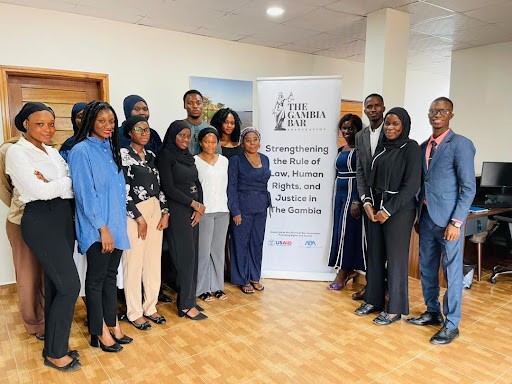By Kebba AF Touray
The Gambia Bar Association (GBA) on Wednesday, 21st August 2024, concluded two-day training for 20 young lawyers.
The training was aimed equipping the young lawyers with the requisite skills, expertise, and knowledge on how to advocate for the fulfillment and enjoyment of the human rights of all citizens, especially the most vulnerable people in society.
It was also aimed at enhancing the participants’ understanding of international human rights legal instruments, with a focus on regional and international human rights mechanisms crucial to the Gambia’s transitional justice process.
The Executive Secretary of the GBA, Ms. Penda Dibba emphasized the importance of the training and the need to empower junior lawyers to lead change within the Bar Association and the legal sector.
She highlighted the various topics that were to be explored during the training, which include regional and international instruments to which the Gambia is a party.
She also provided an overview of the mission of the association to promote the rule of law in the Gambia, saying “the Bar is taking a new direction for change and visibility. We want to drive a narrative for the future of the country”.
Mam Ndeban Jobe of the National Human Rights Committee introduced participants to key human rights principles, emphasizing the inclusivity and universality of these rights. Her session covered core international instruments like the UDHR and ICCPR and highlighted the importance of civil, political, economic, social, and cultural rights.
Lawyer Imaran Darboe delivered a presentation on the role of the Bar in strengthening human rights in The Gambia. He emphasized the Bar’s duty to actively advocate for human rights protection and promotion through campaigns, policy recommendations, and engagement.
His presentation also underscored the centrality of justice in human rights and the critical role lawyers play in safeguarding justice by upholding and strengthening human rights.
Ndey Ngoneh Jeng led a discussion on gender justice, covering its definition, related concepts, and key terminologies. She highlighted gender inequalities in The Gambia, supported by statistical data.
While presenting on children’s rights, Mr. Lamin Fatty from the Child Protection Alliance, explained the international instruments The Gambia has ratified and the state’s obligations in protecting the rights and welfare of children.
Meanwhile, in an interview with the participants, Amadou Bah and Ousainou Suwaneh, all expressed gratitude to the GBA for the initiative, which they said is a step in the right direction that will help broaden their understanding of the human rights situation.
The knowledge gained from the training they said will empower and prepare them to execute their advocacy roles, to ensure the respect, protection, enjoyment, and fulfillment of the rights of the citizens, especially the most vulnerable groups.


















